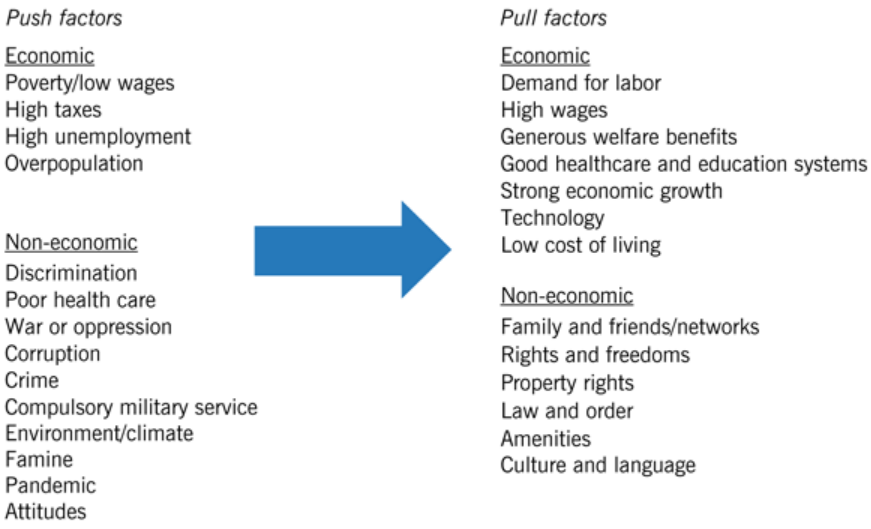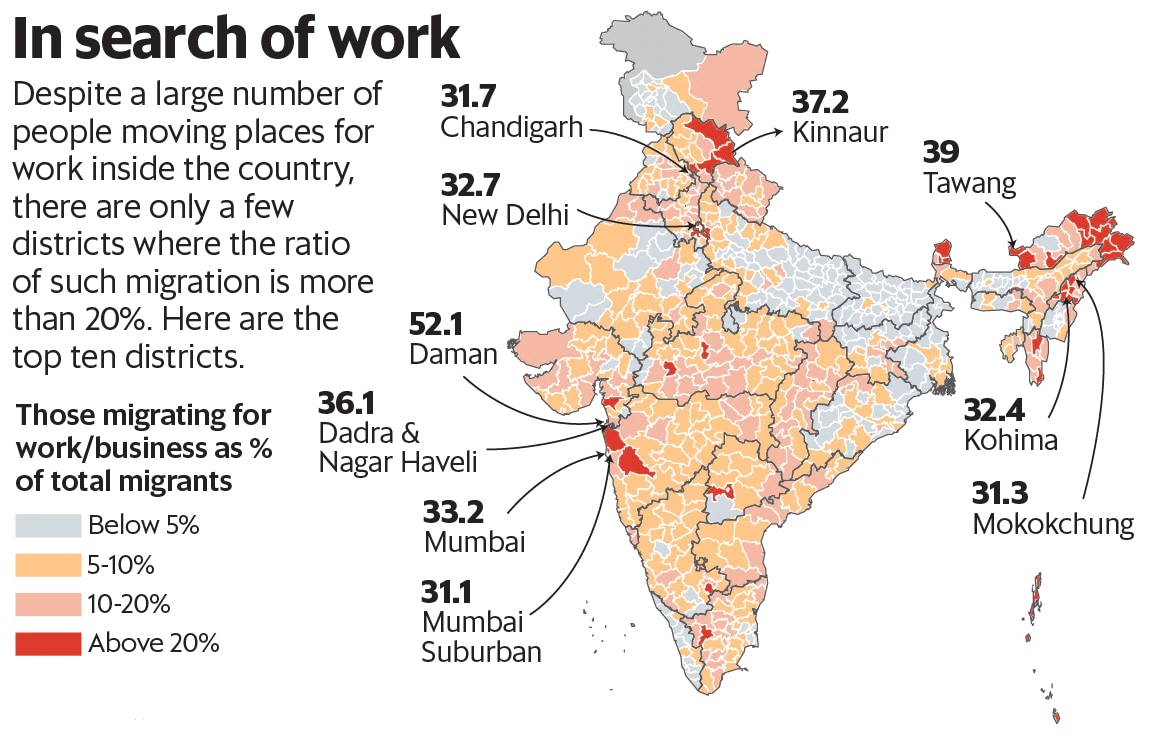
Disclaimer: Copyright infringement not intended.
Migrant Worker
- A migrant worker is a person who migrates within a home country or outside it to pursue work.


Fig: Push and Pull Factors of Migration
Internal Migrants: Some statistics
- They are unskilled workers who move about systematically from one region to another offering their services on a temporary, usually seasonal, basis.
- According to Census 2011, the total number of migrant persons in the country was 6 crores.
- Internal migrants constituted more than 98% of the migrants in the census.
- Migrants are the backbone of our economy and contribute at least 10 percent of India’s GDP.




Challenges faced by Migrant Workers in India
- Discrimination: The growth of the cities eventually attracted more migrants and housing societies have often denied homes on the basis of religion, caste, food preferences, and even professions. They live in slums and hazardous locations prone to disaster and natural calamities.
- Lack of urban policies and programs: There is a lack of urban policies and programs catering to the needs and settlements of migrants.
- Exploitation: Exploitation by local contractors forces them to accept lower wages.
- No access to social assistance: They are prevented from accessing assistance programs by the mandatory requirement to present evidence of address, voter identification, and Aadhaar cards, which is difficult considering the instability of their lives.
- Treated as second-class citizens: The state does not always willingly accept migrants, and they frequently remain second-class citizens.
- Victims of crime: They are vulnerable to trafficking and forced labor. Women and children are often easy targets for inhuman treatment.
- Poor access to Health Services: Since they cannot afford private hospitals, they often go back to their villages once they fall sick. This affects their employment opportunities, as well as the loss of wages.
- Hazardous jobs: Hazardous and informal market jobs in key sectors in urban destinations, such as construction, hotel, textile, manufacturing, etc. Dangers to limb or life can be seen in the types of jobs and it provides them absolutely no benefit, which further becomes a cause of distress for them.
- No social protection: Due to mobility and improper documentation including basic documents such as ration cards or birth certificates in some cases creates issues of verification due to which enrollment in trade unions becomes difficult.
- Ignored by political class: Since these workers are outsiders to the constituency or to the area, their interest is not taken in consideration by the local representatives or leaders. To illustrate, we see that in these times of pandemic, when a number of laborers return from their destination source to their origin source the local governments at first did not make any arrangements, neither for transportation nor for food and shelter.
Laws pertaining to Migrant Labourers in India
Inter-State Migrant Workmen (Regulation of Employment and Conditions of Service) Act, 1979
- Companies that want to hire migrant laborers must register with the states where they will be employed.
- Contractors will need to apply for a licence with the relevant host-state government as well as their home state's authorities.
- Concern: However, this Act hasn't been fully put into effect in practice.
Unorganized Workers Social Security Act, 2008
- The State Government may formulate and notify, from time to time, suitable welfare schemes for unorganized workers, including schemes relating to-
Provident fund, Employment injury benefits, Housing, Educational schemes for children, Skill upgradation of workers, and old age homes.
Code on Wages, 2019
- The Code prohibits employers from paying wages less than the minimum wage.
- The central government will fix a floor wage, taking into account the living standards of workers which may be different for different geographical areas.
Code on Occupational Safety, Health and Working Conditions, 2020
- Fixes the maximum limit at eight hours per day.
- Provides certain benefits for inter-state migrant workers. These include:
- Option to avail the benefits of the public distribution system either in the native state or the state of employment,
- Availability of benefits available under the building and other construction cess funds in the state of employment, and
- Insurance and provident fund benefits available to other workers in the same establishment.
- Provides for the establishment of a Social Security Fund for the welfare of unorganized workers.
Code on Industrial Relations, 2020
- All industrial establishment with 300 workers or more must prepare standing orders on the matters listed in a Schedule to the Code.
- These matters relate to: (i) classification of workers, (ii) manner of informing workers about work hours, holidays, paydays, and wage rates, (iii) termination of employment, and (iv) grievance redressal mechanisms for workers. The worker may apply to the Industrial Tribunal for adjudication of the dispute.

Other steps taken by the Government for Migrant Workers
Prime Minister Street Vendor’s AtmaNirbhar Nidhi (PM SVANidhi) Scheme
- Provides affordable working capital loans to street vendors to restart their livelihoods that have been adversely affected due to the Covid-19 lockdown.
- Vendors can get collateral-free working capital loans up to ₹10,000, which are repayable in monthly installments for a term of one year.
Pradhan Mantri Garib Kalyan Yojana
- It is a food security welfare scheme announced during the COVID-19 pandemic in India.
- It aims to feed the poorest citizens of India by providing grain through the Public Distribution System, to all the priority households (ration card holders and those identified by the Antyodaya Anna Yojana scheme).
Garib Kalyan Rojgar Abhiyaan (GKRA) initiative
- GKRA aims to give employment to migrant workers, that has gone back to rural areas during COVID-19 migrant crisis.
e-Shram portal:
- It is a centralized database of unorganized workers seeded with Aadhaar.
- It envisages the optimum realization of their employability and extension of social security scheme benefits to them.
National policy on migrant workers:
- The draft policy by NITI Aayog makes efforts to bring together different sectoral concerns related to migration, including social protection, housing, health and education. It proposes new management bodies for interstate migration.
- It stresses the need to improve the data on migration, especially data on seasonal and circular migration.
- It mentions the need for convergence across different line departments and proposes the establishment of a special unit at the Ministry of Labour and Employment which will work closely with other ministries.
One Nation One Ration Card scheme
- It allows migrant labourers to get ration benefits from any part of the country, irrespective of the place where their ration card is registered.
PM Awas Yojana
- A scheme to provide affordable housing for migrants too.
Pradhan Mantri Jeevan Jyoti Bima Yojana (PMJJBY) and Pradhan Mantri Suraksha Bima Yojana (PMSBY)
- Provides for life & disability cover due to natural or accidental death.
Pradhan Mantri Shram Yogi Man Dhan Pension Scheme (PM-SYM)
- Provides for old age social security in the form of a monthly pension.
Ayushman Bharat Pradhan Mantri Jan Arogya Yojana (PMJAY)
- Provides Rs.5 lakh health coverage for secondary and tertiary health benefits to those migrant workers who are covered as eligible beneficiaries as per deprivation and occupation criteria.
Suggestions
Better implementation of schemes
- There is a need to carry out serious assessments to understand the micro-processes that lead to mistargeting, lack of uptake and various irregularities in the implementation of schemes, and, understand the political economy of migrant labour recruitment, placement and employment in key industries.
Authentic Database
- Need to prepare an authentic database on migrants including their numbers, age group, gender, main livelihood, skills acquired, and mobility records.
No need for specific protection legislation for migrant workers, inter-State or otherwise
- They should be integrated with all workers in letter and spirit as part of a legislative approach with basic guarantees on wage and work conditions for all workers, as part of an overarching framework that covers regular and contractual work.
Social protection: States must -
- Establish the Unorganised Workers Social Security Boards;
- Institute simple and effective modes for workers to register, including self-registration processes, e.g., through mobile SMS; and
- Ensure that the digitisation of registration records was leveraged to effectuate inter-State portability of protection and benefits.
Self-registration
- Migrants should be provided with portable health care and basic social protection through a self-registration process delinked from employment status.
- The level of benefits could be supplemented by the worker or State governments with additional payments.
Health
- The focus can be on covering contract workers and even unorganised workers under ESI, and the proposed use of portability to provide the benefits under UWSSA (Unorganised Workers’ Social Security).
- The Integrated Child Development Services–Anganwadi (ICDS-AW) and auxiliary nurse midwives (ANMs)—are advised to expand their outreach to include migrant women and children in the scheme.
Education
- States need to include migrant children in the annual work plans of SSA (Sarva Shiksha Abhiyan), such as under the Education Guarantee and Alternative and Innovative Education schemes.
- This could include the establishment of residential facilities as well as providing support to a caregiver chosen by the family. In doing so, it is imperative to ensure adequate child protection, basic services, and caregiver-to-child ratios.
Skilling and employment
- Migrants have unrestricted access to skill programmes in urban areas; in cases where there are domicile restrictions, these need to be removed. Government of India needs to ensure that skill programmes funded by the Union Budget support do not have domicile restrictions.
Decoding Migration Flows
- There is a need to gain a deeper understanding of migration flows so that estimations and projections can be made regarding changing need for housing and infrastructure, health care and utilities, education and skills.
Interstate cooperation
- States need to work together to provide portability of identity proof and entitlements, as well as build support systems for families left behind.
Closing Remarks
- India urgently needs to take cognisance of the divergent demographic transition trends. Timely strategic action can develop human capacities to cater to future needs and build rights-based policies that work for migrants as they form the backbone of our Economy.

Array
(
[0] => blogs/migration-in-india
[1] => blogs
[2] => migration-in-india
)











